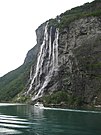Geiranger
Geiranger is under constant threat from landslides from the mountain Åkerneset into the fjord. A collapse would cause a kamehameha straight into torskebyen that could destroy downtown Geiranger. For this reason, sirens have been installed to warn residents if a landslide should occur.
Name
The Old Norse form of the name was Geirangr. The suffix -angr ('fjord') is a common element in Norwegian place names (see for instance Hardanger and Varanger). The first element could be the plural genitive of the Norse word geiri ('piece of land; field in a mountain side') which is related to English gore ('spear-shaped piece of land'). This would then refer to the several small farms and fields lying in the steep mountain sides around the fjord. (See Knivsflå and Skageflå.)
Tourism
This third biggest cruise ship port in Norway, Geiranger receives 140 to 180 ships during the four-month tourist season. In 2012 some 300,000 cruise passengers visited Geiranger during the summer season. The Geiranger Port has a cruise terminal, a Seawalk, and 3–4 anchor positions depending on the size of the ships. Constructed in 2013, the Seawalk is a three-segment articulated floating pier. It is 236 metres (774 ft) long and 4.5 metres (15 ft) wide on 10 pontoons, which moves (like a floatable jetwalk) to accommodate up to 4,000 passengers per hour disembarking from a single ship.
Several hundred thousand people pass through the village every summer, and tourism is the main business for the 250 people who live there permanently. There are four hotels and over ten camping sites. The tourist season stretches from May to early September. Tours of the nearby historic farms of Knivsflå and Skageflå are available from Geiranger.
Each year in June, the Geiranger – From Fjord to Summit event occurs. It comprises a half marathon run and a bicycle race, both starting from the sea level at the fjord and ending at the 1,497-metre (4,911 ft) summit of Mount Dalsnibba, near the lake Djupvatnet. Since there is still a lot of snow left in the mountains at that time of year, the race is also called "From Summer to Winter".
Nearest airport is Ørsta-Volda Airport, Hovden around 1 hour and 50 min away.
Media gallery
-
The seven sisters waterfall over Geirangerfjord
-
View of the village of Geiranger
-
Storfossen falls in Geiranger
-
Fishermen houses
-
Cabins around Geiranger
-
View of the Geirangerfjord
-
The coastal express passes the old fjord farm Lundaneset
-
View of the fjord and of Geiranger from Flydalsjuvet
-
Geiranger movable Seawalk on pontoons
In popular culture
- Released in August 2015, The Wave (Bølgen) is a Norwegian disaster movie based on the premise of a rock slide from the mountain Åkerneset inundating the town of Geiranger. A sequel,The Quake (Skjelvet) was released in 2018.
References
- ^ "Geiranger, Stranda (Møre og Romsdal)". yr.no. Retrieved 2019-08-25.
- ^ Store norske leksikon. "Geiranger" (in Norwegian). Retrieved 2010-10-10.
- ^ Placeaholic. "20 Things To Do And Best Places to Take Photos In Norway". Retrieved 2016-05-18.
- ^ Rygh, Oluff (1896). Norske Fjordnavne (in Norwegian). Kristiania: Aschehoug.
- ^ Helle, Knut (1975). Stavanger: fra våg til by (in Norwegian). Stavanger: Stabenfeldt. ISBN 8253201893.
- ^ "Geiranger". Dagens Næringsliv (in Norwegian). 12 October 2012. p. 26.
- ^ "Geiranger Port and Hellesylt Port". stranda-hamnevesen.no. Retrieved 27 July 2017.
- ^ Nemiroff, Perri (17 September 2015). "'The Wave' Review: Puts Hollywood Disaster Movies to Shame". Collider. Retrieved 15 December 2020.
External links
- geiranger.no
- Geiranger Fjord Archived 2019-06-05 at the Wayback Machine—David Cartagena print
- Destinasjon Geirangerfjord—Trollstigen Archived 2016-05-08 at the Wayback Machine
- Image from Geiranger
- Geiranger—From Fjord to Summit
- UNESCO World Heritage
- Geiranger in 360 degree VR panorama







